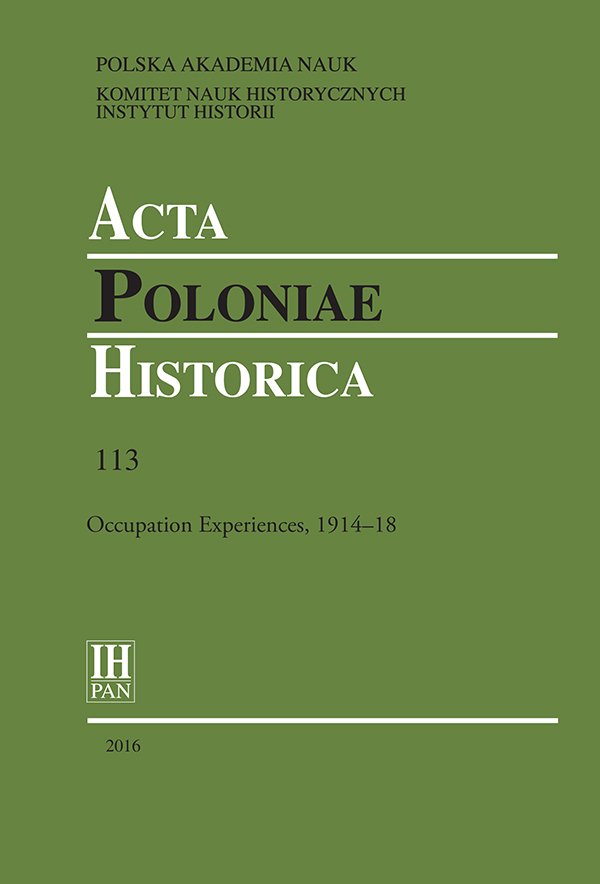The Lemkos’ Great War: Wartime Experiences of the Lemko People, 1914–18
DOI:
https://doi.org/10.12775/APH.2016.113.01Schlagworte
First World War, Lemko people, Thalerhof camp, political repression, occupation, Greek Catholic Church, national identity, Spanish fluAbstract
The First World War imposed a severe stigma on the Lemko people, the Ruthenian mountaineers residing on the northern mountainside of the Carpathians. Military operations, political repressions, malnutrition, and epidemics of contagious diseases caused severe damages and losses in the population and materials. In the late 1914 and early 1915, the front-line was set through the Lemko Land. The area’s eastern part was occupied for several months by the Russians. The occupational authorities planned to annex the area after the war, as they recognised the Lemkos as part of the Russian nation. On the other hand, the Lemko people were generally treated by the Austro-Hungarian authorities with suspicion, as allegedly favouring Russia. They were accused of sabotage and collaboration with the occupiers. Many a Lemko was executed, often without any proof of guilt whatsoever. Some 2,000 were sent to an internment camp in Thalerhof, not far from Graz. The war facilitated the split among the Lemkos into those who considered themselves members of a Ukrainian nation and those who recognised themselves as a separate ethnic group.Literaturhinweise
Barszczewska Agnieszka, Mołdawscy Csángó a Rusini Karpaccy (1867–1947). Problemy rozwoju tożsamości zbiorowej w Europie Środkowo-Wschodniej w XIX i XX wieku (Warszawa, 2012).
Czajkowski Jerzy (ed.), Łemkowie w historii i kulturze Karpat (Rzeszów, 1992).
Halczak Bohdan, Dzieje Łemków od średniowiecza do czasów współczesnych (Warszawa, 2014).
Hoffmann George, Goll Nicole-Melanie, and Lesiak Philipp, Thalerhof 1914–1936. Die Geschichte eines vergessenen Lagers und seiner Opfer (Herne, 2010).
Horbal Bogdan, Działalność polityczna Łemków na Łemkowszczyźnie 1918–1921 (Wrocław, 1997).
Krochmal Anna, ‘Społeczność greckokatolicka w Galicji w okresie inwazji rosyjskiej (1914–1915)’, Miscellanea Historico-Archivistica, xxi (2014), 227–55.
Lasocki Zygmunt, Polacy w austryjackich obozach barakowych dla uchodźców i internowanych (Kraków, 1929).
Mick Christoph, Kriegserfahrungen in einer multiethnischen Stadt. Lemberg 1914–1947 (Wiesbaden, 2010).
Moklak Jarosław, Łemkowszczyzna w II Rzeczypospolitej. Zagadnienia polityczne i wyznaniowe (Kraków, 1997).
Pająk Jerzy Z., Od autonomii do niepodległości. Kształtowanie się postaw politycznych i narodowych społeczeństwa Galicji w warunkach Wielkiej Wojny 1914–1918 (Kielce, 2012).
Przybylski Paweł, Rola duchowieństwa greckokatolickiego w kształtowaniu się opcji narodowych wśród Łemków w latach 1918–1947 (Toruń, 2004).
Olszański Tadeusz A., ‘“Ruscy mieszkańcy gór…” – instrukcja wojskowa z 1914 r.’, Magury (1985), 96–100.
Osadczy Włodzimierz, Święta Ruś. Rozwój i oddziaływanie idei prawosławia w Galicji (Lublin, 2007).
Szczupak Adam, Greckokatolicka diecezja przemyska w latach I wojny światowej (Kraków, 2015).
Szlanta Piotr, ‘“Najgorsze bestie to są Honwedy”. Ewolucja stosunku polskich mieszkańców Galicji do monarchii habsburskiej podczas I wojny światowej’, in Urszula Jakubowska (ed.), Galicyjskie Spotkania 2011 (Zabrze, 2011), 161–79.
Watson Alex, Ring of Steel. Germany and Austria-Hungary in World War I. The People’s War (New York, 2014).
Wójtowicz-Huber Bernadetta, “Ojcowie narodu”. Duchowieństwo greckokatolickie w ruchu narodowym Rusinów galicyjskich 1867–1918 (Warszawa, 2008).
Downloads
Veröffentlicht
Zitationsvorschlag
Ausgabe
Rubrik
Lizenz
Title, logo and layout of journal are reserved trademarks of APH.Stats
Number of views and downloads: 729
Number of citations: 1



